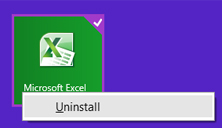The Brode Report | Jan 2018
Wall Street Journal Tells Us To Give Up Excel
 Hi! Hi!
It’s been over half a year since I did a newsletter. I can’t believe it’s been so long, and I apologize. My tendency when I’m very busy is to neglect the newsletter, and 2017 was a great year, but still, there’s much going on which is worthy of a brief comment.
A quick kid update first, which also underscores the passage of time.
- Zach is now getting a Master’s in Economics and for next year is looking for a Research Assistant position or otherwise working for Ph.D. economists before he goes back for a doctorate.
- Emma is in freshman year at McGill in an interdisciplinary cognitive science program.
- Zoe is well-entrenched in the Israeli Army, doing challenging and interesting work
- Jake is a freshman at Boulder High, with Ruthie set to join him there next year.
- Oliver is killing it at Centennial Middle School.
I’ll work hard on staying in touch better in 2018!
Best,
David |
|
The Wall Street Journal Tells Us To Give Up Excel
 Periodically I read articles about the death of email. Somehow, after 20+ years of regular email use, it remains one of the key tools in my work day. Similarly, spreadsheets are another ubiquitous tool that pundits love to hate. Periodically I read articles about the death of email. Somehow, after 20+ years of regular email use, it remains one of the key tools in my work day. Similarly, spreadsheets are another ubiquitous tool that pundits love to hate.
It all started when the Wall Street Journal wrote about how CFOs were telling their employees to Stop Using Excel. I felt like they were calling my baby ugly. The reaction came swiftly. Hundreds of comments came in, which prompted a follow-up article: Finance Pros Say You’ll Have to Pry Excel Out of Their Cold, Dead Hands. The headline made it sound like the article was pro-Excel, but it wasn’t. Instead it raised new objections. The solution, according to the articles: get specialized software applications to take the place of Excel.
The full list of objections in the two articles can be summarized as:
| 1. |
Data Issues |
| |
- |
Data in Excel is not connected to other systems. “Errors can bloom because data in Excel is separated from other systems and isn’t automatically updated.” By contrast, the article says, “newer software connects with existing accounting and [ERP] systems.” |
| |
- |
Excel has limits to how much data can be in a spreadsheet. |
| |
- |
When different teams use Excel to crunch their different data sets, they come up with different results. |
| |
- |
People spend too much time “importing and exporting and manipulating data, I want them to focus on what is the data telling us.” |
| 2. |
Collaboration Issues |
| |
- |
Excel is not multi-user |
| |
- |
There is software that’s better for a monthly data gathering and planning exercise than “distributing hundreds of Excel spreadsheets to regional and unit leaders.” |
| 3. |
People want to use Excel for bad reasons |
| |
- |
Obviously, people feel strongly about Excel, but it’s just because you can futz with it and people feel ownership about something they built. |
| |
- |
People who don’t want to give up Excel in favor of new specialized software are Luddites. And some of them still use calculators (gasp!). |
| 4. |
Excel errors can be terribly costly |
| |
- |
Spreadsheets can cause huge problems. The article mentions the 2012 J.P. Morgan London Whale $6.5B loss, where a spreadsheet error played a role in claiming reduced volatility, but certainly isn’t responsible for the scale of the loss, which was done by the equivalent of the classic strategy of doubling your bet each time you lose. |
 There’s a lot to unpack here. Let’s start with the Data Issues. The complaint that Excel has limits in its ability to handle data is fair, of course. But all systems have limits. Excel used to have 65K rows and 256 columns, and there were times where that was a real limitation. Now Excel has 1M rows and 16K columns. Yes, technically there’s a limit. But how often do you reach it? Realistically, the limit is more about your computer’s RAM. There’s a lot to unpack here. Let’s start with the Data Issues. The complaint that Excel has limits in its ability to handle data is fair, of course. But all systems have limits. Excel used to have 65K rows and 256 columns, and there were times where that was a real limitation. Now Excel has 1M rows and 16K columns. Yes, technically there’s a limit. But how often do you reach it? Realistically, the limit is more about your computer’s RAM.
And, while you’re working with the data you’re learning about it. Nir Kaissar makes the point that “manipulating” data, far from being a time-wasting task, is “a critical first step in [the] search for meaning.” A CFO who laments that staff wastes time moving data around is one who has forgotten how critical it is to deeply understand the data you’re analyzing.
 The objection that “when different teams use Excel to crunch their different data sets, they come up with different results” is almost laughable when you condense the story to a single sentence. Clearly the problem with that isn’t the tool itself. But what this does point out is that how you get data into Excel is terribly important to how efficiently you can analyze that data. Thus this is related to the objection that “Excel is not connected to other systems” and thus different teams have different data or inputs in a spreadsheet may be out of date. This certainly is true in many companies. But strong analysts are experts in data exfiltration. With just a bit of systems-oriented thinking it’s possible to create repeatable, automated processes for getting data from an ERP into a spreadsheet. Indeed, many data storage products anticipate the need to export to Excel, and some even have add-ins which let you access the data directly from Excel. Charley Kyd of www.exceluser.com made the point that all the complaints about Excel being used as a database or Excel having out-of-date inputs are really an issue about how one connects Excel to data stores. There are myriad products for doing this--and there have been for over 20 years. These products have only gotten better. Twenty years ago I was a heavy TM1 user, but now it’s part of IBM Cognos. Now, PowerOLAP seems a reasonable successor. But there are numerous SQL databases connected to Excel, not to mention the data querying capability native to Google Sheets. The objection that “when different teams use Excel to crunch their different data sets, they come up with different results” is almost laughable when you condense the story to a single sentence. Clearly the problem with that isn’t the tool itself. But what this does point out is that how you get data into Excel is terribly important to how efficiently you can analyze that data. Thus this is related to the objection that “Excel is not connected to other systems” and thus different teams have different data or inputs in a spreadsheet may be out of date. This certainly is true in many companies. But strong analysts are experts in data exfiltration. With just a bit of systems-oriented thinking it’s possible to create repeatable, automated processes for getting data from an ERP into a spreadsheet. Indeed, many data storage products anticipate the need to export to Excel, and some even have add-ins which let you access the data directly from Excel. Charley Kyd of www.exceluser.com made the point that all the complaints about Excel being used as a database or Excel having out-of-date inputs are really an issue about how one connects Excel to data stores. There are myriad products for doing this--and there have been for over 20 years. These products have only gotten better. Twenty years ago I was a heavy TM1 user, but now it’s part of IBM Cognos. Now, PowerOLAP seems a reasonable successor. But there are numerous SQL databases connected to Excel, not to mention the data querying capability native to Google Sheets.
Of course, using Excel to analyze data and make the right decision depends on having good data. But it’s not Excel’s job to gather that information, that’s the province of an analyst. Managing data flows is a key skill these days.
The articles contend that the real solution is a specialized software package. Certainly as novel activities become regularized and static, they tend to move from Finance to IT. But they come back to Excel because there’s always some new cutting edge question which those systems never anticipated. And since Excel is the best tool we have for flexible, general analysis, that’s where we go.
In the end, Excel is like democracy. It's the worst FP&A software out there except for all the others.
As for the other objections, this is getting a bit long so I’ll finish up this analysis next month.

|

